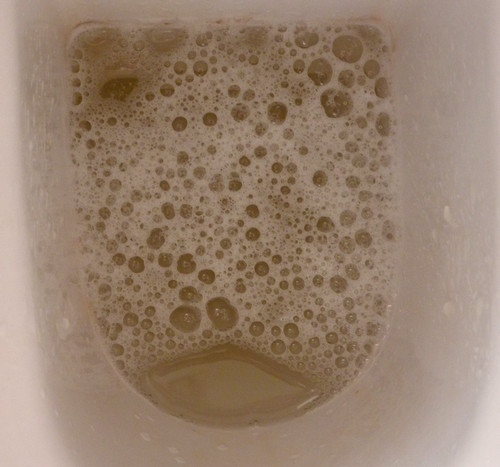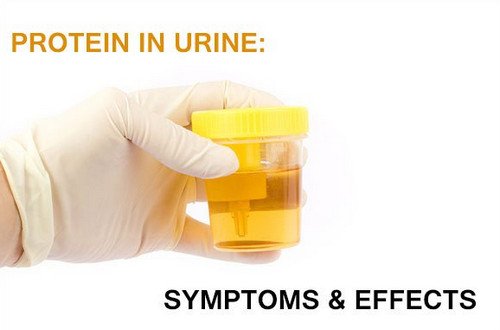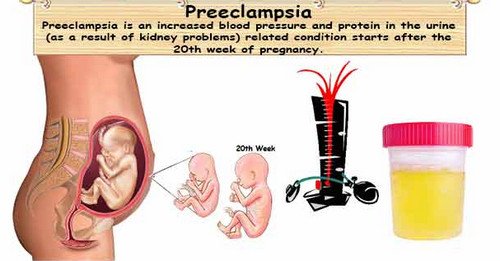Bubbles in Urine
Last reviewed by Dr. Raj MD on January 12th, 2022.
What does bubbly urine mean ?
There are a variety of reasons for the presence of bubbles in urine. Most of the reasons are harmless, but one shouldn’t underestimate the possibility of underlying medical condition.
Bubbles in urine are normal but if it has been going on for a long period of time and accompanied by other alarming symptoms, then it could be associated with a serious health condition. (1, 2)
Pictures

Image 1: A urine full of bubbles, which is an indicator of a serious underlying health condition.
Picture Source: doctordecides.com

Photo 2: A urine specimen with a high level of protein.
Image Source: www.drelist.com

Image 3: A sample urine of a pregnant women with preeclampsia.
Picture Source: healthy-ojas.com
What causes bubbles in urine
The causes for bubbles in urine are divided into two categories: non-alarming and alarming causes. Let us look at them in detail.
Non- alarming causes
- Pregnancy – Bubbles in urine during early pregnancy is normal. The reason for this is that some women experienced enlarged kidneys during pregnancy, which increases the possibility of having small bubbles in urine. It is also during the pregnancy stage that the kidneys filter the excess level of amino acids. If the level of amino acid exceeds more than the normal, the kidneys won’t be able to absorb it all. As a result, the excess protein escapes into the urine causing it to foam or bubble. (2, 3)
- Rapid urination – urinating quickly, especially in the morning can cause bubbles in urine. When we are asleep at night, the fluids accumulate in the bladder leading to rapid urination early in the morning. If you see bubbles in urine in morning, then it probably is because of rapid urination.
- Mild dehydration – If your body is dehydrated, the urine becomes concentrated and one of the signs of concentrated urine is the presence of bubbles. Those people with diabetes mellitus are prone to dehydration, which is why their urine with foam or bubbles.
- Presence of chemicals in the toilet bowl – The chemicals in your toilet cleaner can form bubbles when mixed with other substances such as urine.
- Presence of semen in urine – Right after sexual intercourse, a small amount of semen is left in the urethra. If there is a malfunction in the bladder sphincter, there is a possibility that the remaining semen will go back to the bladder causing bubbles in urine. (3, 4, 5)
Alarming causes of bubbles in urine
The causes of bubbles in urine can be alarming if it is accompanied by other symptoms such as generalized body weakness, swelling of the upper and lower extremities, nausea with or without vomiting, loss of appetite, changes in urine output, lack of sleep, and dark colored or cloudy urine.
The possible underlying health conditions for presence of bubbles in the urine include the following:
- Proteinuria – it is the presence of high level of protein in the urine. Urine has various components including protein in small amount. If the level is way too high, the urine appears foamy or bubbly. It is an indicator that something is not right in your kidneys.
- UTI (urinary tract infection) – A urinary tract infection happens when the bacteria enter the urinary tract. The clinical manifestations include increase in the frequency and urgency of urination, flank pain, burning sensation when urinating, and presence of bubbles in urine. If you are experiencing any of the symptoms mentioned above, then you should immediately see your doctor.
- Kidney-related disease – the presence of bubbles in urine can be a sign of an underlying kidney disease. A urinalysis or urine test can determine if you have a kidney disease.
- Preeclampsia – It is a complication in pregnancy leading to excess protein in urine, swollen legs, headaches, and high blood pressure. Swelling is an indicator of fluid retention. Preeclampsia should be dealt with the soonest time possible because it is a fatal condition both for the mother and the fetus. (5, 6)
- Vesicocolic fistula – What is a fistula? It is an abnormal connection that develops between the colon and the bladder. What makes this alarming is that it permits the flow of air, gas, and bacteria. They could freely travel to the bladder leading to frequent infection and formation of bubbles in urine. The clinical manifestations are similar to that of the urinary tract infection. Hence, it is important to consult your doctor to determine whether you are suffering from UTI or vesicocolic fistula. (2, 11)
- Other possible causes – Other medical conditions that could lead to foamy or bubbly urine include cancer, diabetes mellitus, cardiac-related disease, liver disease, chemical poisoning, sickle cell anemia, and rheumatoid arthritis. (5, 6, 7)
Diagnosis
If you have been consequently noticing bubbles in urine, then the doctor will order for a urine test (urinalysis) to determine the level of different components of urine. The level of creatinine and albumin will be checked too. It determines the functions of the kidneys.
Treatment and management
The treatment and management for bubbles in urine depend on the root cause of the problem. If the underlying cause isn’t alarming at all, then treatment won’t be necessary because the foam or bubbles in the urine will eventually clear up after a few days.
However, if the underlying cause is alarming, then you should see your doctor for appropriate treatment. Ideally, the treatment is focused on improving the functions of the kidneys and strengthening the body’s immune system. (8)
Patients with kidney-related problems are strongly advised to eat a well-balanced diet. Increase the intake of healthy foods such as fruit, vegetables, legumes, grains, fish, and lean meats. The intake of sodium-rich foods should be restricted. The patient should also get rid of carbonated beverages. Hydration is important. Hence, the patient should increase his intake of fluid, specifically water and natural fruit juices. Maintain a healthy weight, avoid vices such as excessive smoking and drinking of alcoholic beverages. Reduce the exposure to stress and make it a habit to exercise regularly. (8, 9, 10)
A foamy or bubbly urine isn’t really a problem if it happens every once in a while. If it has been going on for a long period of time, then it could indicate that something is not right in your kidneys. Kidney-related diseases can be fatal. Hence, immediate treatment and intervention are needed.
Note : You should immediately see your doctor for proper treatment and management.
References:
- https://www.fastmed.com/health-resources/bubbles-in-urine/
- https://www.belmarrahealth.com/bubbles-urine-causes-symptoms-treatment-tips/
- http://www.md-health.com/Bubbles-In-Urine.html
- https://www.doctorshealthpress.com/general-health-articles/bubbles-in-urine/
- http://www.healthyandnaturalworld.com/bubbles-in-urine/
- https://www.menshealth.com/health/what-does-your-pee-mean
- http://bestremedyideas.com/foam-or-bubbles-in-urine-causes-treatment-and-top-home-remedies
- http://www.betterhealthtips.org/what-causes-bubbles-in-urine/
- http://www.foodpyramid.com/conditions-disorders/bubbles-in-urine-10923/
- https://www.mayoclinic.org/diseases-conditions/urine-color/expert-answers/foamy-urine/faq-20057871
- http://www.newhealthguide.org/Bubbles-In-Urine.html